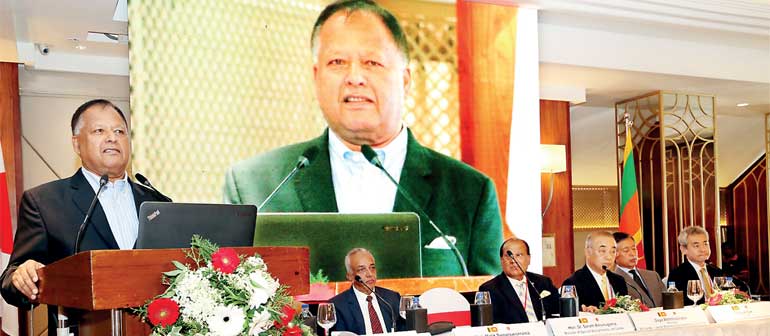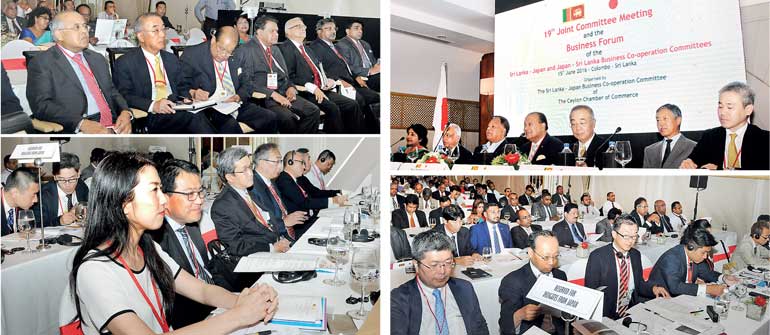Tuesday Feb 24, 2026
Tuesday Feb 24, 2026
Tuesday, 28 June 2016 00:01 - - {{hitsCtrl.values.hits}}
Following is the speech
delivered by Special Assignments Minister Dr. Sarath Amunugama at the Sri Lanka-Japan Business Forum held in Colombo recently
It gives me great pleasure to be here at this meeting especially because over 30 years ago I joined Lalith Athulathmudali in Tokyo when we first established the Chamber of Sri Lankan and Japanese Commerce. Some of the original participants are here with us at this meeting, and some others are long gone, but I recall very clearly that historic occasion.
Sri Lanka and Japan have always been the best of friends. Unlike many other countries, Sri Lanka has clearly shown that we consider Japan to be our close friend. After the end of the Second World War, a conference was held in San Francisco to decide on the reparations, the damages that were claimed by all the victorious countries that participated in the war.
Only Sri Lanka of all those hundreds of countries said we do not seek reparations; we are friends of Japan and as a Buddhist country we want to set an example to all other countries by saying that we don’t want a single yen. That is a gesture that successive Japanese Governments have appreciated.
Even today when we go to Japan – I was there two weeks ago – many distinguished leaders of Japan recalled that grand gesture.
 Special Assignments Minister Dr. Sarath Amunugama addressing the Sri Lanka-Japan Business Forum
Special Assignments Minister Dr. Sarath Amunugama addressing the Sri Lanka-Japan Business Forum
Japan’s interest in Sri Lanka
There are other reasons also why Japan should be particularly interested in Sri Lanka. Today, two-thirds of the world’s sea traffic goes past the southern part of Sri Lanka. All the ships carrying oil to Japan, not only Japan but the whole Far East, go past our Hambantota Harbour. So you can imagine what great strategic value Sri Lanka has for Japan.
Japan is not an oil producing country. You have to depend on oil to lubricate your industry. Sometime ago you opted for nuclear energy but now after Fukushima, there is a large public opinion in Japan against nuclear plants. So Sri Lanka with its harbour in Hambantota, only a few kilometres away from the biggest sea lane in the world should be of great interest to you.
Another reason is that Japan was one of the earliest investors as well as supporters of Sri Lanka. We were recipients of a large amount of Japanese funding in many of our important sectors. I recall particularly the power and energy sectors. Many of the infrastructure, particularly the transmission lines and electricity generation in Sri Lanka, were funded by Japan and implemented by Japanese companies.
Then the early road works, the Parliament of Sri Lanka, the hospital in Battaramulla and many other large projects including the development of the Colombo Harbour were all done with Japanese assistance. So not only politically but in an economic sense also Japan and Sri Lanka have co-operated with each other.
New growth strategy
We meet today as very good time because Sri Lanka has now embarked on a new growth strategy and Japan has also embarked on a process of much wider global investment and engagement. After the G7 Meeting, Prime Minister Shinzo Abe made a statement that Japan will substantially increase funding that will become available for infrastructure development in Asia.
As my colleague Malik Samarawickrama described to you, we have two major development areas. One will be the Port City in Colombo where 380 hectares will be created out of what is now sea and a financial and a trading hub will come up there. So that will change not only the coastline of Sri Lanka but also its economy. It will create a new investment climate because so many opportunities will become available.
The second development will be in Hambantota. A new port and a new airport and other infrastructure projects such as big hotels have been completed. We are now providing 1,000 acres for investment by foreign industrialists.
I don’t have to explain to you about the Shenzhen example. That is, you locate your industry which should be on a large scale close to a harbour. Sri Lanka in addition to the harbour has got an airport. So we have both the sea and air connectivity which will make Hambantota a hub for manufacturing industry.
You know that the world is entering a new era of manufacturing. There is a shift away from the old manufacturing centres which depended almost exclusively on cheap labour. That has gone on for three decades. Now after the experiences of the global downturn, everybody is looking at their domestic industrial output and their domestic employment creation.
We have seen, for example, the rise of Donald Trump in America. It shows that the US is re-thinking its free trade policies. There will be protection in the West though they may not be called protection. There is an opportunity for those industries that can cut costs and take advantage of a strategic location and its natural competitiveness.
Japanese investment in Sri Lanka
We look forward to Japanese investment in Sri Lanka. We are midpoint between the Middle East and Far East. Twenty kilometres to the north of Sri Lanka is one of the largest growing markets of the world – the Indian market. Even in the Indian market, it is the southern three states of Chennai, Bangalore, and Andra Pradesh which are the leaders of Indian economic growth. So we have access just 20 km away not only to India but to the most productive and fast growing areas of India.
Then look at the South. To the South of Sri Lanka all the way to South Pole there is no landmass. I need not explain to you the problems that are emerging in the South China Sea. Japan, Philippines, Vietnam and China are all claiming islands there but South of Sri Lanka there is no such conflict.
We have to develop our blue economy; we have to harvest the sea. There is a large potential for Sri Lanka in the sea. In east coast of Sri Lanka we have to do a new survey of mineral resources. Japan has helped us through the last three decades to develop some of mineral resources in the east. But now we can go to a higher level because the Eastern Province is rich in mineral resources.
It was earlier a war zone but now we can develop our mineral resources in that province. I know that Japanese investors will be very happy to develop mineral resources. Of course the country’s potential has to be nurtured so that we can face competition.
Speed vs. quality
Now one question arises, about which we have to be very frank. We have discussed it in Tokyo also. It is the question of speed vs. quality. Today everybody agrees that Japanese quality is outstanding. The projects you undertake, the projects that are carried out by your companies, are all of top quality. Any government will be happy to collaborate with a Japanese partner because we know that in the end the quality will be first class.
But we do have a problem of speed. There are other countries, other donors, who act much faster than you. You have top quality but you take time. This is one of the topics that we will have to discuss in this seminar. We have to get off the block very fast. We know Japan can look at these matters in a very detached way, a very sophisticated way. It is not a problem that only Sri Lanka faces.
The problem of speed; it’s not only the problem of investors. It is also a problem of the recipient. We have to streamline our own investment facilitation. Most investors who come to Sri Lanka are quite satisfied with our work force. We have, for example, some Japanese companies in the BOI in the Biyagama who have told us that Sri Lankan labour is the best labour in South Asia.
Sri Lanka is the only country where the middle management can be strengthened with local workers. In other countries you have to bring your middle managers from Japan, to read manuals and to get a factory going. In Sri Lanka, largely due to the continuous investment in education, Sri Lankans can learn languages fast, they can read Japanese language manuals and has a very adaptable labour force. Thus Sri Lanka is very competitive in the labour market, considering the fact that our workers have better linguistic and analytical skills.
We are entering an age of keen competition. So look at Sri Lanka because we can be competitive and if there are obstacles the Government is quite ready to remove them so that our comparative advantage is retained.
Finally, on behalf of the President of Sri Lanka, Maithripala Sirisena, I want to tell you that you are most welcome to our country and hope that you will contribute to a long and fruitful relationship between our two countries.
Pix by Gitika Talukdar
